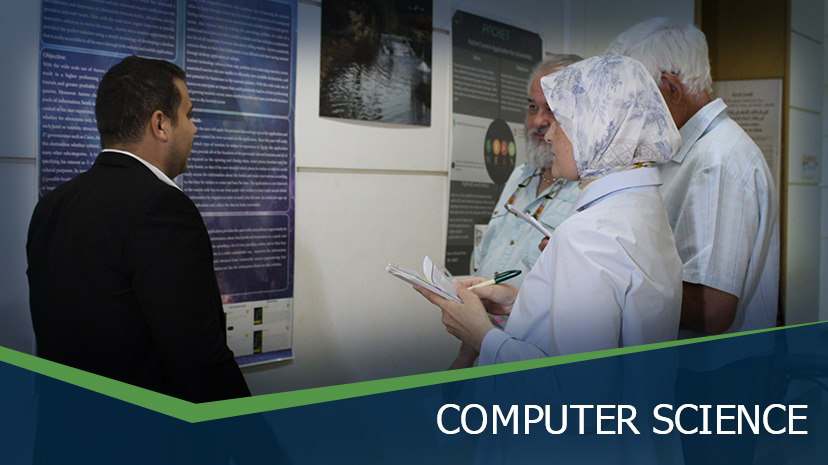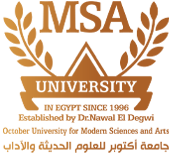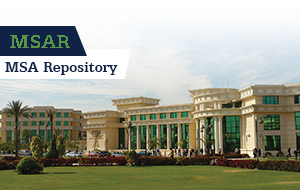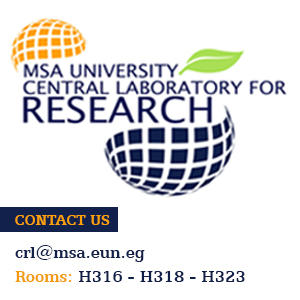About Faculty of COMPUTER SCIENCE

Established in 1996, the Faculty of Computer Science at MSA University offers contemporary programmes designed to meet the demands of the local and international markets. In response to the need for a new generation of advanced computer specialists and professionals, the faculty provides a B.Sc. Degree adhering to international standards.
The curricula have been reviewed and guided by the QAA Computing subject benchmarks, and the Supreme Council of Egyptian Universities and NAQAAE’s NARS to ensure that the offered curricula meet the required professional standards of knowledge, cognitive and practical subject-specific skills, as well as transferable graduate skills.
The programmes strike a balance between practice and theory, ensuring that practical activities are underpinned by an understanding of fundamental principles.The practical application of knowledge builds confidence, reinforces understanding, and prepares students for various aspects of the workplace. Projects are designed to foster creativity, critical and reflective thinking, and provide an opportunity to demonstrate competence and skills by working independently on practical solutions to given problems. Students at the Faculty of Computer Science are encouraged to develop autonomous learning and interpersonal skills, becoming effective communicators, self-motivated individuals, aware of their strengths and weaknesses, with a clear vision and plan for their future. The Computer Science programmes offer a focused technical course of study, emphasising software development and computer theory, with the aim of teaching students how computers are used to solve real-world problems.
So, our students develop excellent programming skills while building a solid foundation in the theory and practice of computer science and software engineering.
The University of Greenwich has more students studying overseas with collaborative partners (including franchises) than any other UK university – over 16,000 students at 59 institutions. Major partners include SBCS in Trinidad, MSA in Egypt, and SEGi in Malaysia. https://www.gre.ac.uk/collaborations/students/african-tne-partnerships The programmes of the Faculty of Computer Science are validated by the School of Computing and Mathematical Sciences at the University of Greenwich Greenwich University's School of Computing and Mathematical Sciences. Students who successfully complete all parts of a programme, with a cumulative GPA of at least 2.0, receive the University of Greenwich qualification of BSc Honours in Computer Science or BSc Honours in Software Engineering. Students also have the opportunity to attend the appropriate University of Greenwich graduation ceremony in London, UK
You can check the collaboration link for more details https://www.gre.ac.uk/collaborations/students/african-tne-partnerships
Transcripts:
You will be issued a transcript verified by Greenwich University. The transcript will list each module you have taken, stating the academic year in which the module was taken, the module credit rating and grade.Where appropriate, it will also state the award and where appropriate, the classification and title.
CS Brochure
Download: MSA University - The Brochure of Faculty of Computer Science 2015-2016 .
Your Career Awaits You!
Download: MSA university - Career Opportunities of Computer Science.
Dean's Welcome Note.

The Faculty of Computer Science seeks to prepare students for careers as computer specialists of the highest international standards, to enter careers in computer or software design, and for advanced study in computer science. The Faculty of Computer Science has accredited undergraduate degree in computer science, and software engineering disciplines. The degree was evaluated and accredited by the Egyptian Supreme Council of Higher Education in 1998.
Furthermore, Computer Science students can successfully join other universities in Europe and North America, to complete their undergraduate and postgraduate studies. Our programme is designed to provide students with a combination of fundamental knowledge and lifelong learning skills that prepare graduates for a successful career in the computer science and software engineering fields. At the same time, our curriculum provides students with the necessary practical skills to enable them to be productive from their first day on the job.
Graduates of the Faculty of Computer Science at MSA are specialized in several areas within the computing professions. Their expertise and skills are due to unlimited facilities, an up-to-date curriculum and a group of prominent faculty members.
Being in touch with international sites, through the Internet and computer usage, is an integrated part of the Computer Science programme. In addition, students receive extra attention as they are divided into small groups. Long contact hours and close supervision give students the chance to make the most of their faculty experience. Students are thus, provided with capabilities that prepare them for practical fields in computer science at an international professional level. The faculty maintains close relationships with computer companies, which provide support to our programme. We aim to be a center of excellence in computer science for our students, faculty, and local industry.
Graduates of the Faculty of Computer Science have found satisfying careers in leading computer companies. We welcome all students interested in hard and excellent education in Computer Science, of the highest international standards in a unique pleasant educational environment. We are dedicated in providing a high-quality education for all our students.
Your future awaits you here at MSA,
Prof. Dr. Ali Hamed El Bastawissy
Dean of the Faculty of Computer Sciences.
MSA University.
Admission Requirements for Faculty of Computer Science

* Other foreign certificates including certificates from Arab countries are evaluated at the Admission Office in accordance to the regulations set by the Egyptian Ministry of Higher Education.
Rules and Ethics
Attendance Policy: The contact between the staff and student is the most effective means of learning. Class discussions and comments enhance the students’ understanding of the module content providing a new dimension to the learning experience. For these reasons, students are required to satisfy certain attendance requirements. Students who fail to attend 75% of all lectures and tutorials/Labs for a given module are deprived from the final exam and automatically fail the Module. This includes absences for medical reasons and emergencies. Students are required to check with the respective teaching assistants/Student Affairs department as to the number of absents reached in each module.
Late Arrival Policy: Late arrivals disrupt the class and interrupt other student’s concentration. Students are only allowed into the class during the first five minutes. Otherwise, they miss the class and are recorded as absent. During the midterm exams (1.5hrs) students are allowed to arrive up to the first 15 minutes of the exam, while the final examination (3 hrs) students are allowed to arrive up to the first 30 minutes of the exam.
Misconduct Procedures Academic Misconduct Procedures: MSA University complies with the Rules and Regulations of the Ministry of Higher Education in Egypt as per decree 49 for the year 1972, as well as the Rules and Regulations of the Private Universities in Egypt as per decree 101 for the year 1992. All following modifications that have been added from then to date are complied with. MSA students are expected to be honest in their academic endeavours. To falsify the results of one's research, to use the words or ideas of others as their own, to cheat in an examination, or to allow another to commit an act of academic dishonesty corrupts the basis of the academic process. The act of Plagiarism includes:
Where the marker of the assessment suspects that the student’s submitted work is plagiarized or one of the above offences has been committed, the marker shall interview the student establish that an offence has been committed or to demonstrate the plagiarized work and the proportion of the plagiarized work. During this interview, the marker shall give the students the opportunity to present his or her case and mitigating circumstances, if any. Depending on the severity of the plagiarism or the offence being committed, the marker may take one of the following actions:
- Students are reminded of the seriousness of their act and is given a verbal warning. - Students are reminded of the seriousness of their act and are asked to sign a Plagiarism Warning Form (A written warning). - Redo the same assessment or a new assessment within a set deadline. The new mark shall not exceed mark awarded for the offended work, if any. - Redo the same assessment or a new assessment and the new mark shall not exceed the pass mark. - Exclude the plagiarized part of the assessment and mark the work accordingly. - A ward a zero grade to the assessment under investigation.
Probation students are students who fail to achieve CGPA 2.0 (equivalent to C i.e ≥ 60%). Every student has to check his/her CGPA every semester to revise his/her status. Students are informed during their first levels on probation that they should exert utmost effort on raising their CGPA to at least 2.0 (≥ 60%) to avoid being dismissed from the University and to be able to graduate. Probation students are advised to improve their academic standards since students who remain on probation will be dismissed from the university. The numbers of semesters are determined by the Supreme Council of Egyptian Universities. In case of being on probation for:
Spring and summer semesters are counted as one semester. The student is allowed to change major only once. UK CGPA is calculated for only 300, 400 level modules in case of faculty of Computer Sciences.



